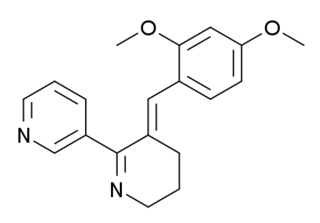A microsatellite is a tract of repetitive DNA in which certain DNA motifs are repeated, typically 5–50 times. Microsatellites occur at thousands of locations within an organism's genome. They have a higher mutation rate than other areas of DNA leading to high genetic diversity. Microsatellites are often referred to as short tandem repeats (STRs) by forensic geneticists and in genetic genealogy, or as simple sequence repeats (SSRs) by plant geneticists.

Monoamine oxidase A, also known as MAO-A, is an enzyme that in humans is encoded by the MAOA gene. This gene is one of two neighboring gene family members that encode mitochondrial enzymes which catalyze the oxidative deamination of amines, such as dopamine, norepinephrine, and serotonin. A mutation of this gene results in Brunner syndrome. This gene has also been associated with a variety of other psychiatric disorders, including antisocial behavior. Alternatively spliced transcript variants encoding multiple isoforms have been observed.
Openness to experience is one of the domains which are used to describe human personality in the Five Factor Model. Openness involves six facets, or dimensions, including active imagination (fantasy), aesthetic sensitivity, attentiveness to inner feelings, preference for variety, and intellectual curiosity. A great deal of psychometric research has demonstrated that these facets or qualities are significantly correlated. Thus, openness can be viewed as a global personality trait consisting of a set of specific traits, habits, and tendencies that cluster together.

GTS-21 (DMBX-A) is a derivative of the natural product anabaseine that acts as a partial agonist at neural nicotinic acetylcholine receptors. It binds to both the α4β2 and α7 subtypes, but activates only the α7 to any significant extent.
In genetics, rs6313 also called T102C or C102T is a gene variation—a single nucleotide polymorphism (SNP)—in the human HTR2A gene that codes for the 5-HT2A receptor. The SNP is a synonymous substitution located in exon 1 of the gene where it is involved in coding the 34th amino acid as serine.
In genetics, rs7997012 is a gene variation—a single nucleotide polymorphism (SNP)—in intron 2 of the human HTR2A gene that codes for the 5-HT2A receptor. The SNP varies between adenine (A) and guanine (G) DNA bases with the G-allele being most frequent. A research study found it to be related to antidepressant treatment. The research group reported that a polymorphism (rs1954787) on another gene, the GRIK4, has also shown a treatment-response-association in this kind of treatment. In a Japanese study rs7997012 was not associated with neither major depressive disorder nor bipolar disorder.
In genetics, rs6314, also called His452Tyr or H452Y, is a gene variation, a single nucleotide polymorphism (SNP), in the HTR2A gene that codes for the 5-HT2A receptor. The SNP is located in exon 3 of the gene and the change between C and T results in a change between histidine (His) and tyrosine (Tyr) at the 452nd amino acid, i.e., it is a missense substitution.
Rs6265, also called Val66Met or G196A, is a gene variation, a single nucleotide polymorphism (SNP) in the BDNF gene that codes for the so-called brain-derived neurotrophic factor.
In genetics, Rs1805054, also called C267T, is a name used for a specific genetic variation, a single nucleotide polymorphism (SNP), in the HTR6 gene. It is one of the few investigated polymorphisms of its gene. C267T is a synonymous polymorphism.
In genetics, rs1799913, also called A779C, is a gene variation—a single nucleotide polymorphism (SNP)— in the TPH1 gene. It is located in intron 7.

Klaus-Peter Lesch is a clinical psychiatrist who has been investigating the neurobiological foundation of personality traits.
Tridimensional Personality Questionnaire (TPQ) is a personality test. It was devised by C. Robert Cloninger. A newer version of the questionnaire is called Temperament and Character Inventory.
In genetics, rs1800955 is a single nucleotide polymorphism (SNP). It is located in the promoter region of the DRD4 gene. This gene codes for the dopamine receptor D4.
In genetics, rs7341475 is a single nucleotide polymorphism (SNP) in the RELN gene that codes the reelin protein. The gene RELN is mapped to human chromosome 7 (7q22.1). The SNP rs7341475 is located in the fourth intron of RELN. The gene RELN has many more SNPs among its 65 exons and 64 introns, — even in intron 4 there are tens of SNPs.
In genetics, rs5569 is a genetic variant. It is a single nucleotide polymorphism (SNP) in the SLC6A2 gene in exon 9. This gene codes the norepinephrine transporter. The SNP is a silent substitution and the nucleotides of both variants code a threonine amino acid.
In genetics, rs4680 (Val158Met) is a genetic variant. It is a single nucleotide polymorphism (SNP) in the COMT gene that codes catechol-O-Methyltransferase. The single nucleotide substitution between G--> A results in an amino acid change from valine to methionine at codon 158.
Colin Cooper is a British psychologist and was a senior lecturer in the School of Psychology at Queen's University Belfast until 2012, when he took early retirement and moved to Picton, Ontario, Canada. Cooper also devised the multiple-choice IQ tests for the BBC television programme Test the Nation. Among the questions, Cooper said that he had managed to "sneak in a few things that interested me", including questions "exploring the link between intelligence and genetics, height and the number of accidents they have had."

Neurocriminology is an emerging sub-discipline of biocriminology and criminology that applies brain imaging techniques and principles from neuroscience to understand, predict, and prevent crime.

Chlorella vulgaris is a green microalgae mainly used as a medical treatment in Japan. It thought to have potential for biofuel production or as a food additive.






